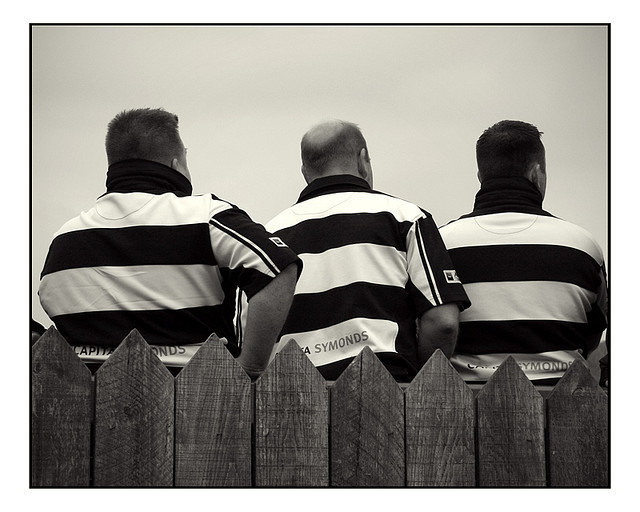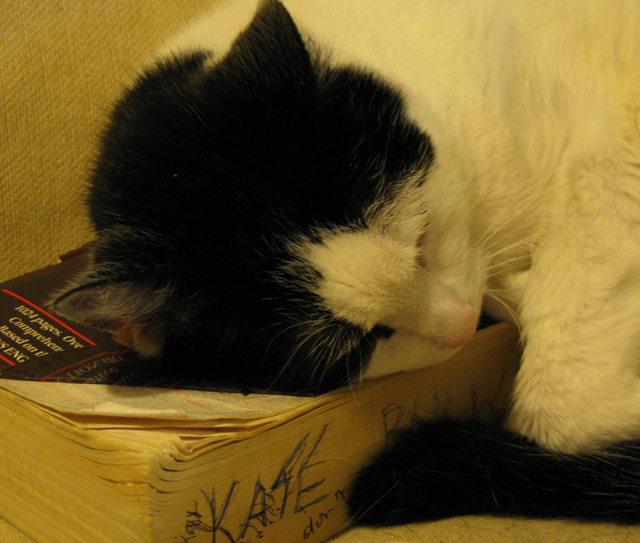(image by ilmungo on Flickr)
 Friday night was almost like being back in the UK: getting drunk, staying up until 7am and eating kebabs. In a twist to the story, however, the kebabs were the first thing on the menu for the evening. Before you call the local lunatic asylum to come and collect me, they’re not all that similar to the UK version. Yes, they are cooked in the same way, but they are actually edible when sober. Much though I love UK kebabs, I don’t think I have ever, nor would ever want to, eat one when I was anything less than three sheets to the wind. Here, however, the meat still looks like and has the texture of meat, and is served on a plate, rather than in a pitta. In Italian fashion, the custom is then to have a side order of vegetables, again served on a plate. There is fresh bread on the side, and (for us, anyway), a half-litre jug of chilled, slightly fizzy, red wine. Yum.
Friday night was almost like being back in the UK: getting drunk, staying up until 7am and eating kebabs. In a twist to the story, however, the kebabs were the first thing on the menu for the evening. Before you call the local lunatic asylum to come and collect me, they’re not all that similar to the UK version. Yes, they are cooked in the same way, but they are actually edible when sober. Much though I love UK kebabs, I don’t think I have ever, nor would ever want to, eat one when I was anything less than three sheets to the wind. Here, however, the meat still looks like and has the texture of meat, and is served on a plate, rather than in a pitta. In Italian fashion, the custom is then to have a side order of vegetables, again served on a plate. There is fresh bread on the side, and (for us, anyway), a half-litre jug of chilled, slightly fizzy, red wine. Yum.
The restaurant that we go to is one that Alex knows well. On entering, we are immediately fixed with a beady stare by ‘la nonna’. She is always to be found sitting at the biggest table in the restaurant, watching the Italian version of ‘Deal or No Deal’ while keeping tabs on everyone who comes in. On Friday, buona sera-ing over with and politeness satisfied, we were free to take our pick of tables, as we were the first people in. This gave us plenty of opportunity to gaze at the decor, which is a thing of wonder. The lights look a little like 1980s-styled snowshoes, folded up flat against the wall or arranged in a circular fan shape on the ceiling. The choice of table is always a big decision, as neither of us wants to be sat beneath one of them, in case they fall down from the wall and hit us on the head. Not that I think it’s actually likely, but who wants to take that chance? There are posters and pictures from all around the world on the walls, advertising Guinness, German sausages and beach huts in Scandinavia. The owner seems to be a well-travelled man, and certainly always has plenty of banter to offer. I start the evening keeping up, but don’t do so well by the time we leave, when I am full of gyros and red wine, topped off with amaro. This may or may not be a good thing – I definitely hear my name mentioned a couple of times, but it all seems to be good-humoured, so I settle for a wide-eyed ‘who, me?’ look, which seems to satisfy. Alex tells me later on that it was a conversation along the lines of him telling the owner that the only reason he brings me along is that I can carry him home. Cheeky sod.
To be fair, he might have had a point. A combination of Friday night joy and the wine that we have drunk makes us giddy, and we spend the walk home laughing uncontrollably at various things. At one point we pass a zebra crossing, which starts from a wide pavement, and leads straight into a 10-foot high concrete wall. We double over with laughter, gasping hysterically at the incongruousness of it all.
When we get back to the flat, we decide to sample the limoncello, which has been chilling in the freezer. It’s good. So good that we have another shot. And another. By 3 or 4 am the limoncello is down to its dregs. We have reached that state of drunkenness where we feel almost sober again, and yet are still discussing deeply philosophical matters. We’re both knackered, yet there’s a feeling that neither of us really wants to go to bed just yet. It’s a nice state to be in. Contentedly, we put the world to rights. Light begins to creep through the shutters. We watch it happen, not really connecting the dots. Suddenly we realise that it’s 7am and the room is bright enough for us not to need the lamps on any more. Alex is lying on the sofa looking knackered, but still just about awake. ‘Non fa male, per un uomo vecchio’, I tease him. Torn between being impressed that I’ve managed to string together a correct sentence in Italian and wanting to retaliate for the old man comment, he settles for a rude gesture. Laughing, we take ourselves off to our respective beds, trying not to think about the hangover we’re bound to have when we wake up later in the day. Ouch.
St Clements
 (images by Kate Bailward)
(images by Kate Bailward)
This post has been entered into the “Grow Your Own” roundup, created by Andrea’s Recipes and hosted this month by House of Annie.
Everywhere you turn at the moment there are oranges and lemons. A few weeks ago the Italian flatmate went to his nonna’s and came back staggering under the weight of oranges, fennel and puntarelle that she’d given him. The staff room fridge at school is stuffed to the gills with oranges, and the other day one of the teachers mentioned that she’d been picking lemons. I innocently asked if she could spare a few for me to make limoncello. The look of joy on her face should have alerted me: the next day she turned up with a shopping bag full of them. I only needed 3 or 4. Lemonade, anyone?
The best thing about using fruit straight from the tree is that it’s so imperfect and yet so good. None of it is the same size or shape, but it IS all delicious. There’s a strange beauty in the weird forms of these enormous, misshapen fruits. One looks more like a pumpkin than a lemon, while another looks like a speckled apple. You only have to get within 3 foot of them to know that your eyes are deceiving you, though: the scent coming off them is amazingly strong. When I peel a couple of them, the oil sprays off the skin in a fine, yet visible mist, and the smell pervades the entire flat for an hour afterwards. When I then cut the zested lemons into quarters to freeze them, the juice runs everywhere, dripping over the edge of the board and making a sticky, deliciously-scented mess. Going back to supermarket lemons, small, dry and hard, will be a wrench after this winter.
To make limoncello, you need 95% pure alcohol. Doubtful I’ll be able to get hold of that, I go to the supermarket in search of vodka. For a good five minutes I gaze glumly at the choice in Sidis, which is either dirt cheap (and therefore probably pretty akin to paint-stripper), already flavoured (useless to me) or decent and expensive, which I don’t really want to waste on an experiment. Finally, I decide on the paint-stripper version. At least if everything goes wrong I’ll only have paid out €7. About to head across to the checkout, I glance over to see if there’s any decent whisky on the shelf. No, there isn’t. But there IS pure alcohol! Hurrah! In three different bottle sizes, and dirt cheap. These Italians are crazy, but brilliant. Still, with all these oranges and lemons sitting around, I suppose everyone’s doing the same as me at the moment, and desperately trying to get rid of them. Operation Limoncello is most definitely ON.
I head back to the flat in a state of feverish excitement and start peeling lemons. The smell is delicious, but by god it takes ages to do. The recipe I’m using is very clear that you should take only the yellow zest, and none of the white pith. Well that ain’t never gonna happen. I do my best, but it’s nigh-on impossible not to end up a little bit pithed. (Arf.) I’ve decided to halve the quantities of the recipe for this first try, so I peel just 2 lemons and drop the zest into a large jar, along with a couple of leaves, then glug in one of the two 50cl bottles of booze that I’ve bought. In a frustrating delay to the story, this now all needs to be left to macerate for at least 48 hours. After this time, I can add the sugar syrup which will (hopefully) transform it from something probably disturbingly like lemon-flavoured turps to sweet, delicious, hopelessly alcoholic limoncello. Yum. A couple of hours later I glance at the jar, and notice that, already, the liquid has turned a pale yellow. That lemon oil is potent stuff, clearly. Every time I go into the kitchen and take a look the colour seems richer and deeper. It currently has an almost amber tinge to it, and there are still another 24 hours of steeping to go. I don’t think I’ve been this excited about making something since growing cress on a paper towel as 5-year old. And that wasn’t even alcoholic.
After 72 hours (I got distracted, OK?), I get around to making up the sugar syrup to add to the by now bright yellow liquid. The zest has turned almost completely white, and even the green of the leaves has faded a bit. I’m nearly as fascinated by the process as by the end result. That’s *nearly* – ultimately, there’s no getting between a greedy woman and her digestivo. I stick a colander over the pan in which I made the sugar syrup, to catch the zest and leaves, and pour the lemony booze through it. Removing the colander, I peer into the pan and grin with excitement. Pre-mixing, the alcohol was clear, as was the sugar syrup. Now, however, the mixture is cloudy, acid-yellow with a tinge of green to it. The most exciting bit, however, is decanting it into bottles. It suddenly all looks really professional: if I could give myself a smug pat on the back, I would. I settle instead for a taste test, sipping the final double-espresso-cup’s worth that wouldn’t fit into the bottles. I pass the cup over to Alex. He sniffs it doubtfully, and peers dubiously at it. “Well, it *smells* like limoncello, and it *looks* like limoncello …” With a nervous squaring of his shoulders, he takes a tiny sip. An incredulous grin spreads across his face and he takes a rather larger mouthful. “It even TASTES like limoncello!” We finish the cup, giggling like naughty schoolchildren. The Limoncello experiment is most definitely a success. So now, about those oranges …
 Recipe (with thanks to AmyAmy’s nonna):
Recipe (with thanks to AmyAmy’s nonna):
Take 2 lemons, fresh from the tree. Taking care to leave behind the white pith, remove the yellow zest and drop it into a large jar, along with one leaf. Cover with 50cl of pure alcohol (95%), screw on a tight-fitting lid to stop the alcohol evaporating, and leave for at least 48 hours.
After 48 hours, make up a sugar syrup. Heat 750ml of water to nearly boiling, then turn off the heat and add 300g of sugar. Stir until the sugar dissolves. Leave to cool.
When the sugar syrup is cold, pour the alcohol into the pan, catching the zest and leaves in a colander. Stir the liquids to combine.
Using a funnel lined with muslin, pour the limoncello into bottles and seal tightly. Drink at will.
Swing Low, Sweet Chariot
 (image by Nicoze on Flickr)
(image by Nicoze on Flickr)
I come from a rugby playing family. Family lore (i.e. my ma) tells me that my parents had a long engagement, due to my dad being unwilling/unable to get married in the rugby season. This was the mid-70s and he was playing for Bedford at the time. His dedication to the rugby cause paid off; in April 1975, Bedford won the Anglo-Welsh knockout cup (now called the LV Cup) at Twickenham. My dad, a prop, scored a try, and then tied the knot with my ma in June. Hurrah! On the day I was born, my mum went into labour in the morning. My dad, however, had rugby training. This being far more important than the birth of his first child, off he went, leaving her to get on with it. (Calm down: he was back by the time I arrived.) When I was actually born and proved to be a girl, my godfather joked, “Never mind: there’ll be an England women’s rugby team by the time she’s 16”. At 14, I wasn’t playing rugby, but my dad still was: at this point for England veterans. My two youngest brothers, at the age of 12, were being coached by Brian Ashton, who later went on to coach England. When Jonny Wilkinson kicked his winning drop goal against Australia in the World Cup, I cried. (So did my Australian flatmate, for that matter, but for rather different reasons.) I kept the final score on my mobile phone for years, and was devastated when I upgraded and lost the text. I think, therefore, it’s fair to say that rugby has been a big part of my life thus far.
Now, I know Italy is a footballing country, but, given that they play in the Six Nations, I didn’t think I’d have a problem finding a channel showing it on TV here. More fool me. Maybe it’s just the channels that we get (or don’t get) here, but rugby was nowhere to be seen. Loads of football commentary, a good few schlocky 80s films, an episode of Poirot dubbed into Italian and about 10 tacky game shows, but no rugby. Aargh!
At this point in time, if you’re not in the UK, you can’t access BBC iPlayer.I’m an English national who is domiciled in Italy. I pay for a UK TV licence, despite rarely watching the BBC even when I am in England. Why, therefore, am I not allowed to access BBC iPlayer here in Italy? There must be some way of setting up a login service, linked to each person’s licence. The Beeb really ought to get on that one. Even if they set it up as a subscription service (à la Spotify) it would be better than nowt. However, that’s a pie-in-the-sky dream for another day, which doesn’t help with my current rugby-free state.
Channelling the temperament of my adopted country, I completely fly off the handle. No English stiff-upper-lip for me. Oh no. I stamp. I shout. I even wail a little bit. The power of the internet comes to help me, and friends recommend various streaming sites. Nothing seems to work, though. The BBC should be proud of their copyright nazis. About 15 minutes into the Ireland-Italy game, to which I had just found a working link, it was taken offline from the site I was using. Dammit! LivePlayer doesn’t work on a Mac. ATDHE isn’t showing the rugby. Proxy sites look like they might help, but then iPlayer’s simultaneous transmission breaks down. CatchupTV won’t let me log in. It seems I am doomed to an afternoon of merely reading twitter updates; the beggar at the sporting feast. Luckily, however, just as I am descending into a truly epic sulk, a friend recommends FilmOn, which works like an absolute dream. It’s free, there aren’t any annoying pop-ups, it runs happily on the Mac, and the quality’s great. Hooray! I’m as happy as a clam, and fill my boots with rugby all weekend.
Watching the mid-game adverts, it suddenly hits me: England’s next game is against Italy. In Rome. On Sunday the 14th. Valentine’s Day. The perverse side of me loves the thought of going to Rome, alone, to watch rugby, on that day of all days. It’s expensive, and I’d spend up to 20 hours travelling for 80 minutes of sport, but I’m definitely tempted. Should I …?
I’ll keep you posted.
Blogging from the Boot – the results
So the results are in for the Blogging from the Boot competition. It was very close-run and hard fought, but in the end I won in *four* categories – unbelievable!
A big thank you to Tina and Cherrye for organising it all, and to Michelle, Georgette and Audra for judging. Most of all, though, thank *you* all so much for voting. I do hope you all enjoyed reading as much as I did – there were some fabulous posts and I’m really pleased to have discovered a whole new set of ace blogs to read.
Congratulations to everyone who took part!
Words
 (image by Kate Bailward)
(image by Kate Bailward)
Dictionaries are wonderful things. I love them. My Collins English dictionary has served me very well over the years, although it’s pretty battered now. Unfortunately I don’t have it with me in Italy, as it was too heavy to pack, so I can’t check the frontispiece for the publishing date. However, it was given to me at prep school by my headmaster, so it’s a good 20-25 years old. As it’s a good-quality dictionary, it’s stood the test of time, and is as useful today as it was back in the mid-80s. Likewise my frickin’ enormous English-French/French-English dictionary (which I’m pretty sure is also published by Collins). It’s the size of an encyclopaedia, but the contents are as sound today as they were 20 years ago, and it’s never let me down.
Sadly, I must report that Garzanti Italian-English/English-Italian dictionaries are nothing like so reliable. The other day, in class, one of my students didn’t know the meaning of ‘hope’, so looked it up in her dictionary. Not only did it not have a definition for ‘hope’, but the entire entry for ‘H’ consisted of one paragraph. ONE PARAGRAPH. If you looked up ‘sperare’ then the correct definition was given, but that’s not much good when you’re trying to go from English to Italian.
I have found, generally, that the dictionaries my students have are pretty inferior quality, which is frustrating. They’re all hell-bent on looking words up rather than trying to work them out from context, or allowing me to explain (which is also frustrating – but that’s a rant for another day). However, far too much of the time the definitions that are given are either misleading or downright wrong. A particularly amusing example of this came up the other day. I had taught a lesson on comparatives (e.g. better, colder, taller) and superlatives (the best, the coldest, the tallest etc). I then sent the students away with, among other things, a gapfill exercise to complete for homework. This consisted of an email written by a boy on holiday in Australia, comparing it to England. One of the words that needed to be inserted into the text was ‘hotter’. (Really? You don’t say!) This had been mentioned in class, but clearly hadn’t sunk in, as one of the students didn’t know what it meant in the context of the exercise. On looking in her dictionary for help, she found that, apparently, ‘hotter’ means ‘young male criminal’. Yes, I was as flabbergasted as you are! Luckily, the student had enough sense to work out that this wasn’t correct, and found it very funny, but it’s somewhat worrying that dictionaries are being published that are so far wide of the mark. I can’t even begin to think what it was that the dictionary’s publishers were trying to translate. The mind boggles. On the plus side, it did lead to an amusing sidetrack into ‘hot-wiring’ and various words to do with criminal activity, though. I do like to teach my kids the really important things in life.
On the other side of the coin, I’ve spent this morning giving myself Italian lessons, which has also led to some confusion. Never let it be said that I don’t know what my students are going through. I use a site called LiveMocha, which I think is great. It’s all based on peer correction, with each student submitting their exercises to the site for correction by other students. I like the happy-clappy shariness of it, and it means that I’m being corrected by native Italian speakers, which is the best way, really.
I am doing the beginner’s course, so the sentences are as basic as can be. The first stage of the lesson consists of reading sentences matched to pictures. So, for instance, a picture of a yellow flower is accompanied by the phrase, ‘Il fiore è giallo.’ A little further on, I was shown a picture of a silver coin and given the phrase, ‘la moneta è d’argento’. I was then shown a picture of a silver car and given the phrase, ‘l’automobile è grigia metallizzata’. Meh. Pot-AY-to/pot-AH-to. In the consolidation exercise that followed, I decided to be a rebel and say that the car was silver, not metallic grey. However, the system told me that was wrong. Bah! Eventually, I worked out that d’argento means, literally, made of silver, but it’s easy to see how confusion sets in.
Oh, if anyone’s interested, I should have said, ‘l’automobile è argentata’, apparently. Bloody Italian word endings.
Oh, the shame!
 (image by vk-red on flickr)
(image by vk-red on flickr)
From the ages of 11-14 I went to a girls’ boarding school near Bristol. As part of our slightly old-fashioned ladylike education, we received both needlework and cookery lessons. To counteract the girliness, we were given geology lessons and had fire exits which (according to school lore) involved abseiling down the side of the building. Doubtful, in truthful terms, but a great story with which to frighten the first years.
Our needlework teacher was a Scottish woman whose name I now forget. All our teachers were officially Miss, Mrs or Mr So-and-So, but I do remember that she had an unusual first name, which we used as ammunition to mock her mercilessly behind her back. (I dread to think what my students say about me. It’s possibly best not to know.) She was probably in her mid to late 40s, but to us she seemed ancient. Yet another reason to be rude about her. Cruel girls.
One easter holiday, my family and I went across to France on the ferry. This was all very exciting, and my brothers and I spent the usual time running about like lunatics on deck, peering over the rails, with our hair and clothes whipping in the wind. After one such wild abandoned charge around the deck, I ran back inside to say hello to my parents – and ran straight into my needlework teacher. I was HORRIFIED. Not only did she have the audacity to be on the same ferry as me, but she added insult to injury by SPEAKING to me. The nerve of the woman! I, of course, did my best pre-teen shuffling and monosyllabic answering to her perfectly reasonable and friendly questions about where I was going and whether I was looking forward to my holiday, and escaped as soon as I judged it (barely) polite to do so. How on earth would I explain to my friends that I’d had to talk to a teacher out of school time? Dreadful!
Fastforward 20 years. I am now a teacher myself, with students aged from 5 to adult. I’ve run into a few of my late-teen and adult students around the place, which has always been fun, as they are grown-up enough not to be bothered about the teacher-student social barrier, and we usually end up having a good chat. However, I suppose it was only a matter of time before I ran into one of my less socially adept students.
It’s Saturday night. I walk into a pizzeria with my friend, who is visiting from England. In my dreadful Italian, I ask for a table for 2. Slightly to my right, I am vaguely aware of three boys eating pizza and laughing together over a story that one is telling. I glance a little more closely and realise that the one in full flow is one of my students. Not just any old student, though; one from my absolute bete-noir class. The class that, every lesson, I have to physically restrain myself from killing. The class that I roundly bollocked for talking over me (yet AGAIN) last me I saw them, and who retaliated by keeping their mouths shut, but all ostentatiously blowing their noses. Yeah, THAT class. As I look over at the table, he also glances up. The look of horror on his face at realising that he’s face to face with his teacher is an absolute classic. I’m transported straight back to that day on the ferry, and despite remembering how appalled I was that I had to make conversation, I wave and cheerfully say, “Ciao!” He has no idea where to put himself. Should he respond and look like an idiot in front of his friends (who are not my students), or should he be rude and ignore me? He settles for a watery grin, while saying nothing. For a brief moment, I almost feel sorry for him. However, I quickly decide that macabre amusement at his expense is far more entertaining. Karma will get me one day, I’m sure, but I’m enjoying tempting it while I can. Hohoho.
Please vote for me in the Blogging from the Boot Competition! I’m a finalist in these categories:
That’s Amore
Eccomi
Mangia
Buon Viaggio
Italianissimo
Blogging from the Boot
Oh wow! Five of my posts have been selected as finalists for the Blogging from the Boot competition. I’m up against some great contenders, so I’d love it if you all went by the competition site and voted for me. Please. Pretty please. There’s chocolate at stake, dammit!
Hear no evil
 (image by Carbon_NYC on Flickr)
(image by Carbon_NYC on Flickr)
In an ideal world, every teacher would write their own materials, tailored precisely to each class’ needs. This is what I was trained to do at college, and I look back fondly on some of the lessons I taught there – indeed, I’ve reused a couple of them (with a few tweaks) with different classes both at summer school and here in Italy. Making a lesson from scratch that really works is the most amazing feeling and I only wish I had the time to do it for each class. Sadly, it’s just not realistic. When I was training, I taught one 40-minute lesson every other day, and would spend all night planning. Literally all night. Bedtime was very often at about 4am or later. I now teach ten 90-minute classes, two 60-minute classes and four 60-minute individual lessons, over the course of four days. I also have a three-hour class once a week with the PON group. On Mondays and Wednesdays (my busiest days) I teach straight through from 2.45 to 9pm. That’s a lot of lessons to plan, with, proportionately, not much time to plan them. Teachers are only paid according to time spent in class (their ‘contact hours’), and even then the pay is pretty pitiful. My wages, when converted into sterling, equate to about half the monthly wage I got for my first part-time job in London, in 1997. Still, on the bright side, when I was an actor I’d often work for absolutely nothing, so it’s a definite step up from that. Besides, as I have no social life here, it’s not like I actually need any money. Don’t tell my boss that, though.
Thankfully for the sake of my sanity and sleep patterns, each of my private classes is assigned a specific coursebook to work from. Students are given two books: the student book and the workbook, plus CDs of listening exercises, and a CD ROM of extra material. I also have in my sticky mitts the teacher’s book, which gives basic lesson plans and a way of working through the student’s book in class. I usually fairly much ignore the teacher’s book, as I find it much more interesting to supplement the lessons with material from other books, as well as exercises of my own (if I’ve had time to think them up). I do, however, use it for inspiration when I’m short of time, and there are sometimes some real gems of ideas in there for extra exercises.
Sadly, coursebooks can also be desperately uninspiring, and some of the themes of the chapters so far removed from the language point as to be almost completely useless. The prospect of teaching modal verbs to a group of adults with a chapter that focused completely on whiney teenage problems (‘everyone tells us what to do – it’s so unfair!’) was particularly horrifying, and I decided it was a far better idea to write my own lessons instead. Ultimately, coursebooks are often a good guide, but can rarely be followed slavishly, as every single class is different.
One of the their big advantages, however, is that the materials are all there, ready to use. They’re particularly valuable for listening exercises, which help to train students’ ears into listening for specific information. Sites like ELLLO are brilliant, but it’s hugely time-consuming trying to source just the right clip, then download it to CD, and write questions based on that clip. I tend, therefore, to stick to the coursebook for this type of exercise.
The other day I was doing a lesson on books and reading. I’ll be honest: I was finding the subject matter a lot more interesting than the students were. Philistines. That’s by the by, however. One of the exercises in the book involved them listening to a CD of an unknown situation, supposedly described in a fictional book, and deciding what was happening. When planning the lesson I’d flicked through the written part of the exercise, but hadn’t listened to the CD. Usually this isn’t a problem in the slightest, as the materials have been designed by the Cambridge Board specifically to go with the book. Brilliant. I therefore explained the exercise to the students, searched for the relevant track and pressed play.
Oh. My. God.
The situation is a gunman on the run both from the police and from Kelly, the plucky heroine of the fictional book. There is no dialogue on the CD, just sound effects. Of a man heavy breathing. And gasping. And then heavy breathing some more. And groaning. By this time, the students are all unsuccessfully stifling giggles. I just about manage to hold it together until I hear a sound effect of a woman shrieking, at which point both the class and I become absolutely helpless with laughter. It was like listening to a particularly bad porn soundtrack, although thankfully without the bom-chicka-WAH-wah guitars in the background.
Once we’ve picked ourselves up off the floor and composed ourselves a bit, the students come up with some good suggestions for what might *actually* have been happening in the story, and we carry on with the lesson. The grammar point for the lesson is might/could have been. I attempt to elicit the TL (‘Target Language’ – yes, teachers have buzzwords too) by telling them a story about how I had phoned my parents the night before, but they hadn’t answered the phone. I then ask the question: ‘Why do you think they didn’t answer?’ in the hopes that I will get a response using the words, ‘They might have been …’ However, given the listening exercise from earlier, and the fact that I’m working with teenagers, there is only one conclusion that these kids are going to come to. Once again the class falls about with laughter. I am left standing at the front of the class half-laughing and half-repulsed, desperately trying to wipe the mental images of my parents shagging from my mind.
I think there might be a moral here somewhere.
PON my word!
 (image by Kate Bailward)
(image by Kate Bailward)
My day-to-day teaching takes place in a private language school. The students that come to my classes come from families who presumably have a reasonable amount of cash to splash, and who have big ambitions for their children. If you ask these students what they want to be when they grow up, you are likely to get a reply along the lines of, ‘oh, I’ll be a doctor – like my parents.’ It’s immensely frustrating, as a teacher, to see some of these children messing around and doing no work, knowing that they’ll probably go on to succeed, whatever they do. Nepotism will get them wherever they want to go.
Man’s Best Friend

Outside of a dog, a book is man’s best friend. Inside of a dog it’s too dark to read.
– Groucho Marx
The journey from Heathrow to Rome goes without incident. It was always going to be the change at Rome that was likely to cause me problems, though, and, true to form, it does. The plane lands about 15 minutes late, which, when I only had an hour and half to change planes anyway, makes it quite tight for time at Fiumicino, which sprawls untidily all over the place. Annoyingly, our plane lands only a few gates away from the one at which I’ll be departing in an hour or so’s time, but we are then bused about 50 miles across the airport to the arrivals gate. When we get off the bus, there is a member of Alitalia cabin crew herding up all the people who are connecting to the Milan flight (why on earth anyone would fly from Heathrow to Rome to then go back to Milan is beyond me, but there’s no accounting for Italians), which is boarding now and due to take off in about 15 minutes’ time. They are all hustled to the front of the security queue, while the rest of us mutter and grumble disgruntledly. This is, of course, eating into my changeover time, and I’m beginning to get a bit antsy. Finally, as I look at the clock and realise that my flight has opened for boarding, I decide to do as the Italians do and just push to the front of the queue with a winning smile. Amazingly, I get away with it. I should do this more often.









